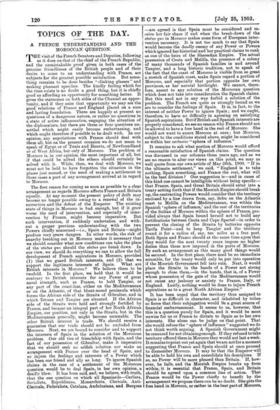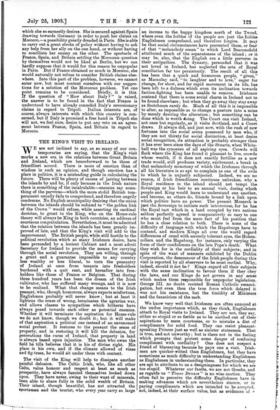TOPICS OF THE DAY.
A FRENCH UNDERSTANDING AND THE MOROCCAN QUESTION. THE visit of the French Senators and Deputies, following as it does on that of the chief of the French Republic, and the unmistakable proof given in both cases of the genuine friendliness of the British people and of their desire to come to an understanding with • France, are subjects for the greatest possible satisfaction. But some- thing remains to be done besides " clinking glasses " and making pleasant speeches. The kindly feeling which for the time exists is no doubt a good thing, but it is chiefly good as affording an opportunity for something better. It gives the statesmen on both sides of the Channel an oppor- tunity, and if they seize that opportunity we may see the good relations of France and England placed on a sure and lasting foundation. There are happily at present no questions of a dangerous nature, or rather no questions in a state of active inflammation, engaging the attention of the diplomatists, but there are three or four questions un- settled which might easily become embarrassing, and which ought therefore if possible to be dealt with. In our opinion, any negotiations with France should deal with them all, but on the present occasion we do not mean to speak of Egypt or of Tunis and Bizerta, of Newfoundland or of West Africa., but only of Morocco. The problem of Morocco is, in our opinion, the most important of all, but if that could be solved the others should certainly be solved with it. While, then, we deal with Morocco, we must not be held to have forgotten the situation in the places just named, or the need of making a settlement in those cases a part of any arrangement arrived at in regard to Morocco.
The first reason for coming as soon as possible to a clear arrangement as regards Morocco affects France and Britain equally. At any moment the present policy of drift may become no longer possible owing to a renewal of the in- surrection and the defeat of the Emperor. The existing state of things in Morocco is bad enough, but if it grew worse the need of intervention, and especially of inter- vention by France, might become imperative. But such intervention, if suddenly undertaken and with- out a proper previous understanding with the two Powers chiefly concerned—i.e., Spain and Britain—might produce very grave dangers. In other words, the risk of anarchy breaking out in Morocco makes it necessary that we should consider what new conditions can take the place of the .status quo should the status quo break down. In our view, we should do everything we can to allow the full development of French aspirations in Morocco, provided (1) that we guard British interests, and (2) that we support the legitimate interests of Spain. What are British interests in Morocco ? We believe them to be twofold. In the first place, we hold that it would be contrary to British interests for any Power of great naval strength, such as France, to hold Tangier, or any part of the coast-line, either on the Mediterranean or on the Atlantic, of that blunt-nosed peninsula which forms the African side of the Straits of Gibraltar, and in which Tetuan and Tangier are situated. If the African side of the Straits were held and strongly fortified by France, and became an integral part of her North African Empire, our position, not only in the Straits, but in the Mediterranean generally, might become untenable. The other British interest is trade. We should receive a guarantee that our trade should not be excluded from Morocco. Next, we are bound to consider and to support the interests of Spain in the solution of the Moroccan problem. Our old ties of friendship with Spain, and the fact of our possession of Gibraltar, make it imperative that we should seek no selfish solution nor make an arrangement with France over the head of Spain, and so injure the feelings and interests of a Power which has been our friend and ally so long. To ignore Spanish claims in the case of a settlement of the Moroccan question would be to deal Spain, in her own opinion, a 'deadly blow. ' It has been said, and, we believe, with truth, that the one question on which all Spaniards—Carlists, Socialists, Republicans, Monarchists, Clericals, Anti- Clericals, Federalists, Catalans, Andalusians, and Basques —are agreed is that Spain must be considered and re- ceive her fair share if and when 'the break-down of the status quo in Morocco makes some form of European inter- vention necessary. It is not the much to say that Spain would become the deadly enemy of any Power or Powers which ignored her historical and her practical claims to rank as one of the heirs of the Shereefian Empire. The actual possession of Ceuta and Melilla., the presence of a colony of many thousands of Spanish families in and around Tangier, and a long historic tradition, not to speak of the fact that the coast of Morocco is visible from so great a stretch of Spanish coast, make Spain regard a portion of Morocco, and especially that portion opposite her own provinces, as her natural birthright. We cannot, there- fore, assent to any solution of the Moroccan question which does not take into consideration the Spanish claims. But this need not in any way forbid a solution of the problem. The French are quite as strongly bound as we are to consider the feelings of Spain. It is, in fact, to the interest of neither Power to ignore Spain ; and we ought, therefore, to have no difficulty in agreeing on satisfying Spanish aspirations. But if British and Spanish interests are properly considered, we see no reason why France should not be allowed to have a free hand in the rest of Morocco. -She would not want to annex Morocco at once ; but Morocco, subject to the conditions stated above, might be considered as within her exclusive " sphere of influence."
It remains to ask what portion of Morocco would afford a reasonable satisfaction of Spanish claims. The question was discussed in our columns three years ago, and as we see no reason to alter our views on this point, we may as well quote from our own article of May 26th, 1900. " If in the ultimate settlement," we said, " England is to take nothing, Spain something, and France the rest, what will be the best division ? Our suggestion is—and in cases of this kind one cannot be intelligible without being specific— that France, Spain, and Great Britain should enter into •a treaty setting forth that if the Moorish Empire should break up, the contracting Powers would consider that the territory enclosed by a line drawn from, say, Sebu on the Atlantic coast to Melilla on the Mediterranean, was within the Spanish ' sphere of influence,' and the rest of the territories of the Sultan of Morocco within the sphere of France, pro- vided always that Spain bound herself not to build any fortifications between Ceuta and Cape Spartel—in order to prevent the closing of the Straits by batteries opposite Tarifa Point—and to keep Tangier and the territory round it for a radius of, say, ten miles as a free port. Both Spain and France should at the same time agree that they would for the next twenty years impose no higher duties than those now imposed in the ports of Morocco. By such an arrangement as this many good things would be secured. In the first place, there need be no immediate scramble, for the treaty would only be put into operation if the Moorish Government fell into ruin. Next, it would place the Straits in the hands of a Power not strong enough to close them,—in the hands, that is, of a Power whose possession of the gate of the Mediterranean would not cause any jealousy or anxiety to France, Italy, or England. Lastly, nothing would be done to injure French aspirations as to a great North African Empire."
It has been urged that the territory thus assigned to Spain is so difficult in character, and inhabited by tribes so fierce that their subjugation would Be a great source of financial embarrassment. It seems to us, however, that this is a question purely for Spain, and it would be most unwise for us or France to dictate to Spain as to her own interests. She alone can be judge on that point. That she would refuse the " sphere of influence " suggested we do not think worth arguing. A Spanish Government might be censured for not obtainingenough. If they refused to take territory offered them in Morocco they wouldnot last &week. It remains to point out yet again that we are not for a moment suggesting that France and Spain should at once proceed to dismember Morocco. It may be that the Emperor'will be able to hold his own and consolidate his dominions. If so, no Power will be more pleased than Britain. If, how- ever, he fails, and the Moorish Empire breaks up from within,it is essential that France, Spain, and Britain should be agreed upon a common line of action. That France would be the Power chiefly to benefit by the arrangement we propose there can be no doubt. She gets the free hand in Morocco, or rather in the best part'of Morocco, which she so earnestly desires. She is secured against Spain drawing towards Germany in order to push her claims on Morocco,—a possibility greatly dreaded in Paris. She is able to carry out a great stroke of policy without having to ask any help from her ally on the one hand, or without having to conciliate her enemy on the other. The spectacle of France, Spain, and Britain settling the Moroccan question by themselves would not be liked at Berlin, but we can hardly suppose that it would for this reason be unpopular in Paris. But if France obtained so much in Morocco, she would naturally not refuse to consider British claims else- where. Into this part of the problem, however, we cannot enter now, but must content ourselves with our sugges- tions for a solution of the Moroccan problem. Yet one point remains to be considered. Briefly, it is this. If the question of " How about Italy ? " is raised, the answer is to be found in the fact that France is understood to have already conceded Italy's reversionary claims in regard to Tripoli. Italian interests are, of course, always interests with which this country is con- cerned, but if Italy is promised a free hand in Tripoli she will not, we feel sure, desire to put any veto on an agree- ment between France, Spain, and Britain in regard to Morocco.







































 Previous page
Previous page